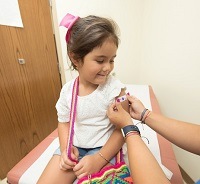 A new study published in JAMA Network Open earlier this month has suggested that children who have previously received liver or kidney transplants were, when given live vaccinations, found to be safe and prompted an immune response to measles, mumps and the varicella-zoster virus that causes chicken pox.
A new study published in JAMA Network Open earlier this month has suggested that children who have previously received liver or kidney transplants were, when given live vaccinations, found to be safe and prompted an immune response to measles, mumps and the varicella-zoster virus that causes chicken pox.
Previously, live vaccines to guard against measles, mumps, rubella (MMR) and varicella-zoster virus (VZV) have not been advised for patients that have received solid organ transplants, as there were concerns regarding the risk of vaccine strain infection in children that are immunocompromised. However, in this study based on data from 18 organ transplant centres, no serious adverse events were reported following the live vaccination of the children enrolled in the trial between 1 January 2002 and 28 February 2023.
Transplant recipients who participated in the trial received one to three doses of MMR vaccine and/or one to three doses of VZV vaccine. The cohort included 281 children on chronic immunosuppressive medications with a median age of 8.9 years at the time of the first post-transplant vaccine. The median time from transplant to enrolment in the study was 6.3 years. Safety data were collected after each vaccination, and antibody levels were measured at zero to three months and one year after vaccination.
The majority of children developed protective antibodies following vaccination — 72% for varicella, 86% for measles, 83% for mumps and 99% for rubella. One year after vaccination, the majority of children who developed protective antibodies maintained that protection — 77% for varicella, 92% for measles, 83% for mumps and 94% for rubella. Five children developed clinical varicella, but all of their conditions resolved within one week.
With the rates of measles, mumps and chicken pox rising nationally within the USA, as well as internationally, these results are vital, as they show that immunocompromised children are being left vulnerable to life-threatening conditions unnecessarily, according to Lara Danziger-Isakov (Cincinnati Children’s Hospital, Cincinnati, USA), who co-authored the study alongside Amy Feldman (Children’s Hospital Colorado, Aurora, USA).
“This shifts the paradigm of the approach to protecting this vulnerable population where live viral vaccines were previously avoided,” Danziger-Isakov said. “This should enable children who have received organ transplants to integrate into their communities with more confidence and decreased risk for acquiring chicken pox or measles, which have both made a resurgence.”
The findings from this study suggest that, in select paediatric recipients, live vaccinations may be safe and immunogenic after solid organ transplant and can offer protection against circulating measles, mumps and varicella. Danziger-Isakov et al state that further research is needed to understand the long-term maintenance of immunity after vaccination of children who receive organ transplants, as well as factors associated with immune response and clinical protection.












